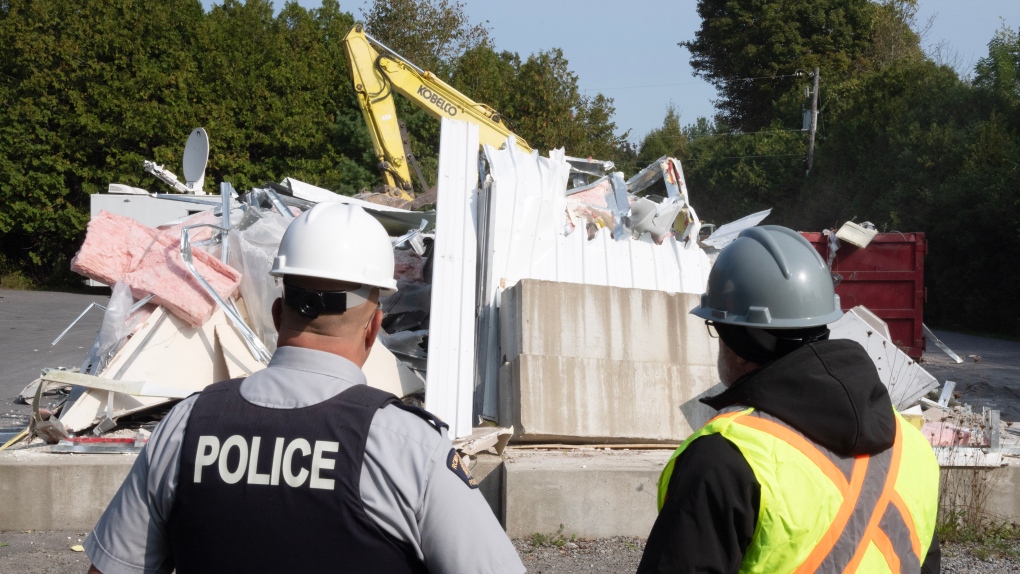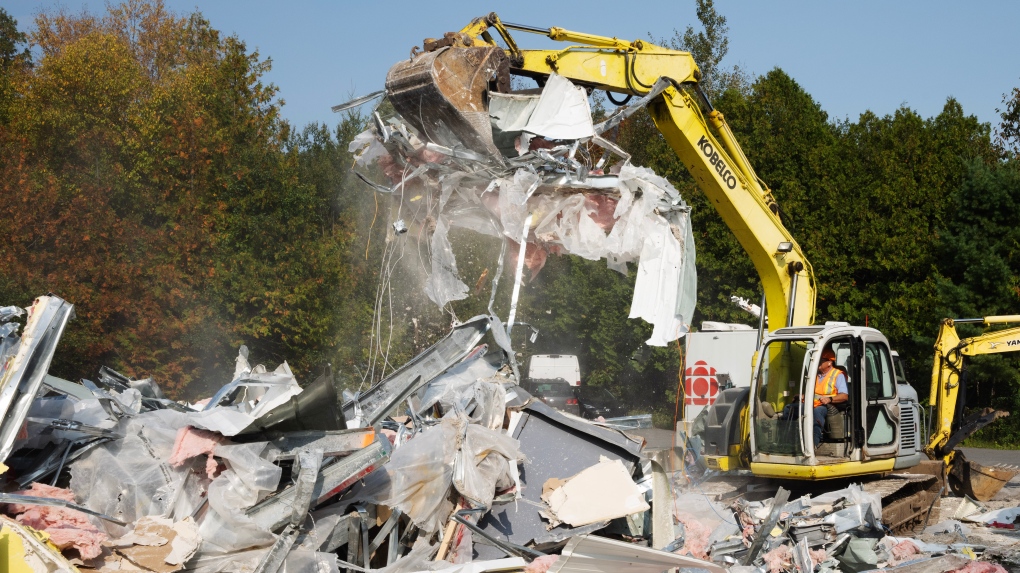RCMP demolish last structure at Quebec's Roxham Road migrant crossing
The last RCMP building came down Monday at Roxham Road, which became an unofficial border crossing used by more than 100,000 migrants crossing into Canada from Upstate New York to apply for asylum since 2017.
Dust and the sound of crumpling metal filled the air while an excavator demolished a white building located at the end of a rural road about 50 kilometres southeast of Montreal, by the United States border.
RCMP Sgt. Charles Poirier told reporters the temporary structure was designed to last a few years and was no longer needed because the flow of asylum seekers across the border had slowed dramatically in recent months.
"The number of migrants that cross through Roxham has dwindled and our presence is no longer necessary," he said.
The unofficial crossing was shut down in late March after the U.S. and Canada closed a long-standing loophole in the 2004 Safe Third Country Agreement to make the deal apply to the 8,900 kilometres of shared border.
Poirier said about 113,000 people used Roxham Road since 2017 to enter Quebec from the U.S. Now, the number of migrants crossing irregularly has slowed to about 14 a week, spread over the entire Champlain sector, which includes Roxham Road and surrounding areas.
The RCMP will no longer maintain a 24/7 presence at the road but will continue to patrol the border with their counterparts from the U.S. Customs and Border Protection, he said.
 An RCMP officer and a worker look on the demolition of the temporary installation for refugee claimants at Roxham Road Monday, Sept. 25, 2023 in St. Bernard-de-Lacolle, Que.THE CANADIAN PRESS/Ryan Remiorz
An RCMP officer and a worker look on the demolition of the temporary installation for refugee claimants at Roxham Road Monday, Sept. 25, 2023 in St. Bernard-de-Lacolle, Que.THE CANADIAN PRESS/Ryan Remiorz
Under the 2004 Canada-U.S. agreement, asylum seekers have to apply for refugee status in the first of the two countries they enter. Before the loophole was closed, migrants were able to cross the border at illegal checkpoints -- like Roxham Road -- and claim asylum in either country.
For years before 2017 Roxham Road had been a popular spot to cross, but the entry point started recording a spike in asylum seekers after the U.S. cracked down on illegal immigration and imposed new restrictions on refugees under then-president Donald Trump.
In response, RCMP built infrastructure at the site to deal with the heavy foot traffic.
Poirier said that while "99.9 per cent" of asylum seekers used to cross at Roxham Road, people are now entering from "all over the territory." On Monday, Poirier said staffing levels would be returned to pre-2017 levels and resources would be distributed more evenly along the border.
He acknowledged that the change means more asylum seekers are crossing through wooded areas, which can put them at risk.
"The temperature is getting colder at night, and it's easy to get disoriented and once you get disoriented, you walk for hours in the woods, then hypothermia sets in," he said. "And if you're with young children then it becomes a problem."
He said there has been a rise in the number of people who are crossing from Canada into the United States, sometimes hours after landing at Montreal-Trudeau International Airport.
RCMP officers are investigating whether human smuggling networks, which Poirier said are likely tied to organized crime, are involved in illegal crossings between the U.S. and Canada. There are reports that Mexican cartels are involved in smuggling, but he couldn't confirm their participation.
Frances Ravensbergen, who lives near Roxham Road, and is a member of the community group Bridges Not Borders, said the demolition of the structures is nothing to celebrate.
All that closing Roxham Road has done, she said, is "pushed the problem to other places," such as airports, elsewhere along the border, and in Plattsburgh, N.Y., where her group often sees asylum seekers camping outside the bus terminal with nowhere to go.
Ravensbergen said that while Roxham Road wasn't "the perfect solution," it at least offered a safe place to cross.
What's truly needed, she said, is for Canadian leaders to "take their place in the world" and address a growing challenge from migrants who need new homes due to climate change, war and extreme inequality.
 Workers demolish the temporary installation for refugee claimants at Roxham Road Monday, Sept. 25, 2023 in St. Bernard-de-Lacolle, Que.THE CANADIAN PRESS/Ryan Remiorz
Workers demolish the temporary installation for refugee claimants at Roxham Road Monday, Sept. 25, 2023 in St. Bernard-de-Lacolle, Que.THE CANADIAN PRESS/Ryan Remiorz
This report by The Canadian Press was first published Sept. 25, 2023.
CTVNews.ca Top Stories

W5 Investigates A 'ticking time bomb': Inside Syria's toughest prison holding accused high-ranking ISIS members
In the last of a three-part investigation, W5's Avery Haines was given rare access to a Syrian prison, where thousands of accused high-ranking ISIS members are being held.
As Australia bans social media for children, Quebec is paying close attention
As Australia moves to ban social media for children under 16, Quebec is debating whether to follow suit.
Irregular sleep patterns may raise risk of heart attack and stroke, study suggests
Sleeping and waking up at different times is associated with an increased risk of heart attack and stroke, even for people who get the recommended amount of sleep, according to new research.
California man who went missing for 25 years found after sister sees his picture in the news
It’s a Thanksgiving miracle for one California family after a man who went missing in 1999 was found 25 years later when his sister saw a photo of him in an online article, authorities said.
Trudeau Liberals' two-month GST holiday bill passes the House, off to the Senate
The federal government's five-page piece of legislation to enact Prime Minister Justin Trudeau's promised two-month tax break on a range of consumer goods over the holidays passed in the House of Commons late Thursday.
Notre Dame Cathedral: Sneak peek ahead of the reopening
After more than five years of frenetic reconstruction work, Notre Dame Cathedral showed its new self to the world Friday, with rebuilt soaring ceilings and creamy good-as-new stonework erasing somber memories of its devastating fire in 2019.
Canada Post temporarily laying off striking workers, union says
The union representing Canada Post workers says the Crown corporation has been laying off striking employees as the labour action by more than 55,000 workers approaches the two-week mark.
Can't resist Black Friday weekend deals? How to shop while staying within your budget
A budgeting expert says there are a number of ways shoppers can avoid getting enveloped by the sales frenzy and resist spending beyond their means.
Montreal shopping mall playing 'Baby Shark' song to prevent unhoused from loitering
A shopping mall and office complex in downtown Montreal is being criticized for using the popular children's song 'Baby Shark' to discourage unhoused people from loitering in its emergency exit stairwells.


































